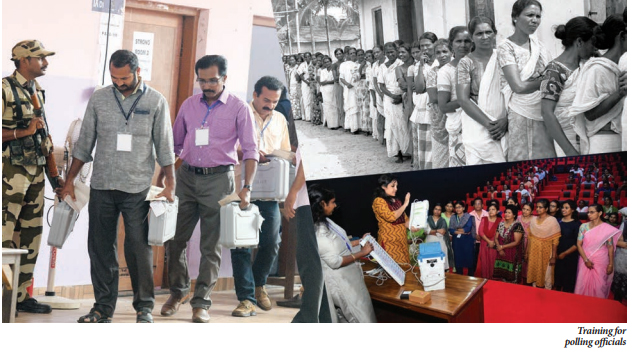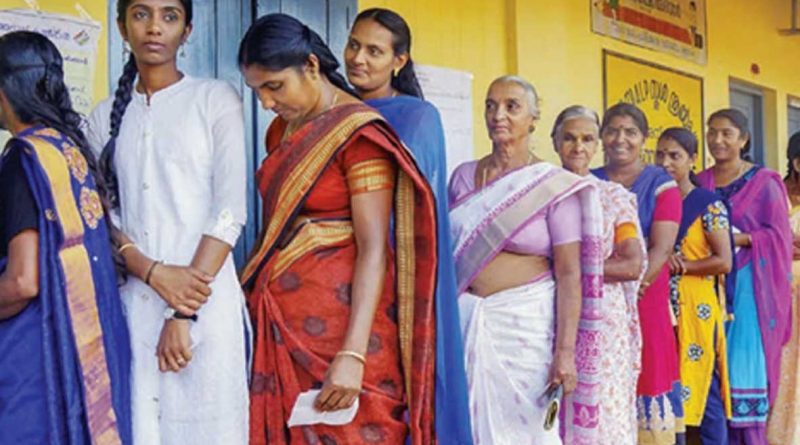Role of Elections in Democracy

There is a real tangible connection between election and people and the various processes and activities involved in it. Casting a vote is not merely a symbolic, expressive gesture but a communicative act, signalling to the governments and political parties the attitudes and approaches of the people. Elections are a constitutional mechanism for orderly political change. Popular sovereignty, one of the fundamental principles of democracy, is ascertained and renewed in elections. It ascertains the sovereign will of the people on matters of policies and the choices of representatives to various representative bodies. Elections are relevant both for the people and the political system at different levels. One, elections give people the self-confidence and the much-needed opportunity for political participation and in the making and unmaking of governments. Two, it provides an opportunity for to people influence policy matters. Through these two functions, ordinary people are empowered and become part of the government.
 During elections, people evaluate the performance of the government and ensure that the system adheres to the professed values and principles of democracy. People get an opportunity to vent their grievances –express their anger and frustration and also have satisfaction in elections. Accordingly, people support, oppose or remain indifferent or neutral to the policies and programmes of the government. At the political system level, elections are occasions for the renewal of its legitimacy through the peaceful and orderly transfer of power from one party to another or re-election of the same party. It gives legitimacy to the ruling dispensation and the opposition. Both represent the people and together constitute what is called substantive democracy. Elections elicit the allegiance of the people for system maintenance and support building.
During elections, people evaluate the performance of the government and ensure that the system adheres to the professed values and principles of democracy. People get an opportunity to vent their grievances –express their anger and frustration and also have satisfaction in elections. Accordingly, people support, oppose or remain indifferent or neutral to the policies and programmes of the government. At the political system level, elections are occasions for the renewal of its legitimacy through the peaceful and orderly transfer of power from one party to another or re-election of the same party. It gives legitimacy to the ruling dispensation and the opposition. Both represent the people and together constitute what is called substantive democracy. Elections elicit the allegiance of the people for system maintenance and support building.
This is affected by the performance of several vital functions which are fundamental to the health of a democracy. One is the political stability of the state for continued functioning of the government for system maintenance. Two, integration of the citizen into the system of government. By voting and electing a government, a citizen becomes part of the government- a pattern of integration between the citizen and the system. Three, protection of the interests of the people vis-a-vis a government. The promises made during an election are essentially related to the interests and welfare of people. Fourth democracy is an act of regular communication between the government and the governed. Elections times are the peak of political communication on myriad issues. Effective communication connects the people and government and leads to democratic conflict resolution of problems faced by the people. Five, political awareness or education of the people about the country, their problems, and the position of different parties on various issues.
Political awareness adds meaning to citizenship and their role in the political system. Six, elections are occasions to recruit and train people for public offices as political activists, parliamentarians and thus enlightened citizens. Seven, political accountability or control functions, elections ensure accountability of the elected to the people. The rulers are held responsible for what they have done and not done through elections. In short, elections are the mechanism by which a democratic political system acquires legitimacy and obtains the consent of the governed through the participation of the citizens in elections. Election times are seed times and harvest times in a democracy. It is seed time as new ideas, perspectives and solutions and thrown open and submitted to the people. That is why it is said elections are a celebration time for democracy and Arend Lijphart more colorfully characterized elections are the dance of democracy. And in this process, elections have transformed the self-understandings of people, the very manner in which they imagine themselves and conduct themselves in a polity. In other words, elections are occasions in which people behave based on their perception and attitude to democracy. And this is valid only if citizens exercise their right to vote. In this sense, every election is an opportunity to reaffirm faith in the theory and practice of democracy. That is why the right to vote is the most sacred right in a democracy.


